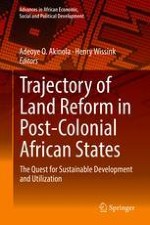2019 | OriginalPaper | Chapter
4. Transforming the Bodi from Pastoralists to Outgrowers: Land and State Capitalism in South Omo, Southwest Ethiopia
Author : Fana Gebresenbet
Published in: Trajectory of Land Reform in Post-Colonial African States
Publisher: Springer International Publishing
Activate our intelligent search to find suitable subject content or patents.
Select sections of text to find matching patents with Artificial Intelligence. powered by
Select sections of text to find additional relevant content using AI-assisted search. powered by
